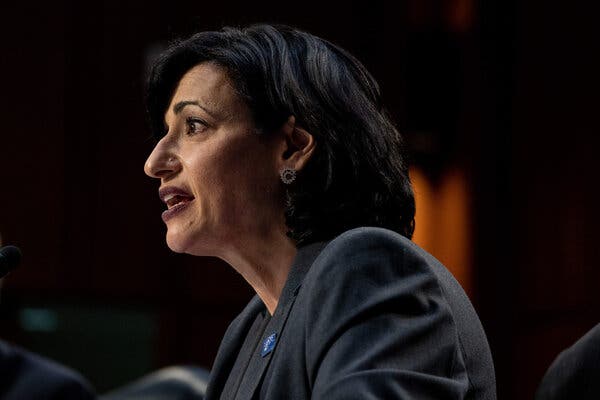F.D.A. Cites Failures at Plant Where J.&J. Doses Ruined
Federal regulators on Wednesday issued highly critical findings from their inspection of a Baltimore plant that was forced to throw out up to 15 million doses of Johnson & Johnson’s coronavirus vaccine and ordered to temporarily stop all production.The Food and Drug Administration cited a series of shortcomings at the massive plant, which is operated by Emergent BioSolutions. The inspection was triggered by reports that Emergent workers had contaminated a batch of Johnson & Johnson doses with the harmless virus that is used to deliver AstraZeneca’s vaccine, which is also manufactured at the plant.The violations included failure to properly disinfect the factory and its equipment, as well as failure to institute and follow proper procedures designed to prevent contamination of doses and to ensure the strength and purity of the vaccine manufactured there. “There is no assurance that other batches have not been contaminated,” the inspectors wrote.Their 12-page report cited nine violations, ranging from the design of the building to improperly trained employees. The inspection was finished on Tuesday.In a statement, the F.D.A. noted that it has not authorized Emergent to distribute any doses of Johnson & Johnson vaccine, and that no vaccine manufactured at the plant has been released for use in the United States.AstraZeneca’s vaccine is not yet authorized for use in the United States, and all the Johnson & Johnson doses that have been administered in the country so far were manufactured overseas. At the agency’s request, all production at the factory has been halted.“We will not allow the release of any product until we feel confident that it meets our expectations for quality,” the statement from Dr. Janet Woodcock, the F.D.A.’s acting commissioner, and Dr. Peter Marks, the agency’s top vaccine regulator, said.The agency said it was working with Emergent to fix the problems.Emergent is a longtime government contractor that has spent much of the last two decades cornering a lucrative market in federal spending on biodefense. The company’s Baltimore plant is one of two federally designated “Centers for Innovation in Advanced Development and Manufacturing” that were supposed to be at the ready in the event of a pandemic.The New York Times reported earlier this month that the Trump administration awarded a $628 million contract to the company about ten months ago despite a history of performance problems. The contract mainly allowed the government to reserve manufacturing space in the plant for vaccine production. On Tuesday, the House Select Subcommittee on the Coronavirus Crisis, announced that it will investigate that contract award and other issues involving Emergent, saying the firm had a track record of failing to meet contract requirements.The inspectors castigated Emergent’s response to the discovery last month that Johnson & Johnson doses had been contaminated with the benign virus used to create AstraZeneca’s vaccine. The incident “has not been fully investigated,” they wrote.They said Emergent did not thoroughly review whether the cross-contamination was caused by one or more workers who move between AstraZeneca’s and Johnson & Johnson’s manufacturing zones or whether it could be related to how raw materials used in the production of both vaccines are handled.The inspectors found that workers frequently moved between the manufacturing zones without documenting that they had showered and changed their gowns as required. In one ten-day period in February, for instance, 13 employees moved from one zone to another on the same day, but only one documented having showered, they said. After the Johnson & Johnson doses were found to be contaminated, the report said, only routine cleaning was performed.Workers also failed to properly handle manufacturing waste, creating risks of contamination in the warehouse where raw materials are stored, the inspectors found. They also cited peeling paint, crowded equipment and other issues with the building. Overall, it “is not maintained in a clean and sanitary condition,” they wrote.Emergent said in a statement on Wednesday that “while we are never satisfied to see shortcomings in our manufacturing facilities or process, they are correctable and we will take swift action to remedy them.”In its own statement, Johnson & Johnson said it had already stepped up its oversight of Emergent, its subcontractor, and that it would “ensure that all of F.D.A.’s observations are addressed promptly and comprehensively.”One major change has already been made: AstraZeneca will no longer be manufactured at the plant, a move that federal officials insisted upon earlier this month to limit the chance of cross-contamination between two vaccines.Dr. Jose Romero, the Arkansas health secretary and chairman of the expert panel advising the Centers for Disease Control and Prevention on the future of the Johnson & Johnson vaccine, said in an interview that he was dismayed by the F.D.A.’s findings. The panel is meeting on Friday on whether to lift, modify or retain a pause in the administration of Johnson & Johnson’s vaccine that was instituted last week for an entirely different issue: the discovery that eight U.S. residents developed a rare but dangerous blood clotting disorder after they got shots.“I’m shocked” Dr. Romero said. “I can’t put it any other way. Inappropriate disinfection, the prevention of contamination — those are significant and serious violations, at least in my mind, and do of course need to be remedied.“I would not have expected that, given the stringency that we have in this country for good manufacturing practices in these vaccine plants,” he said.
Read more →

